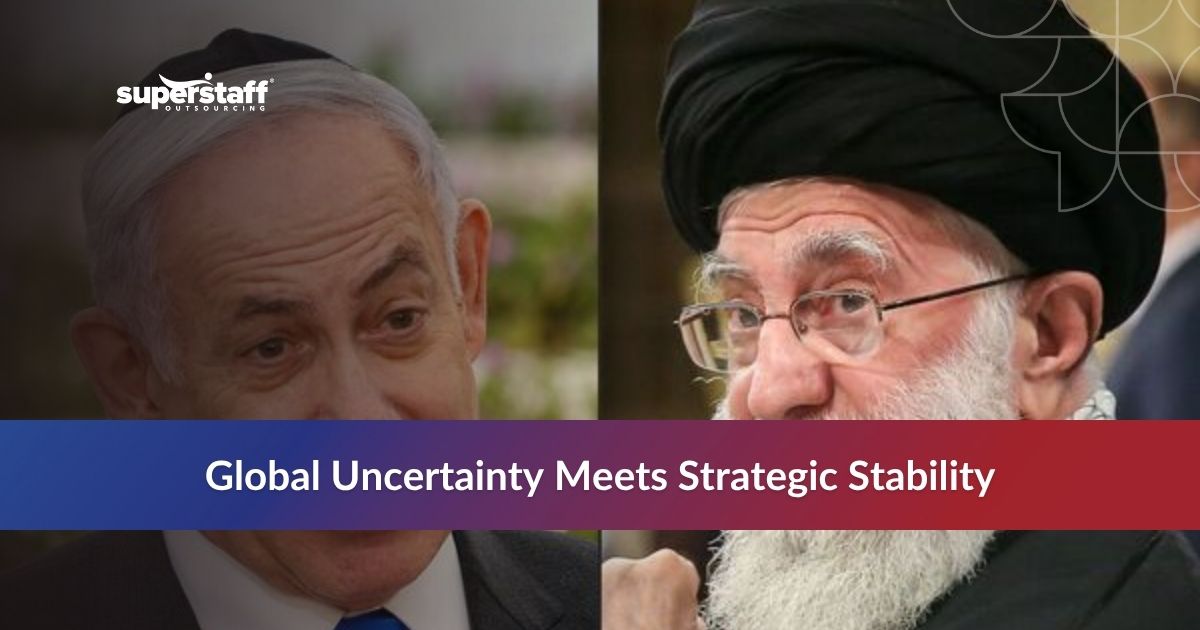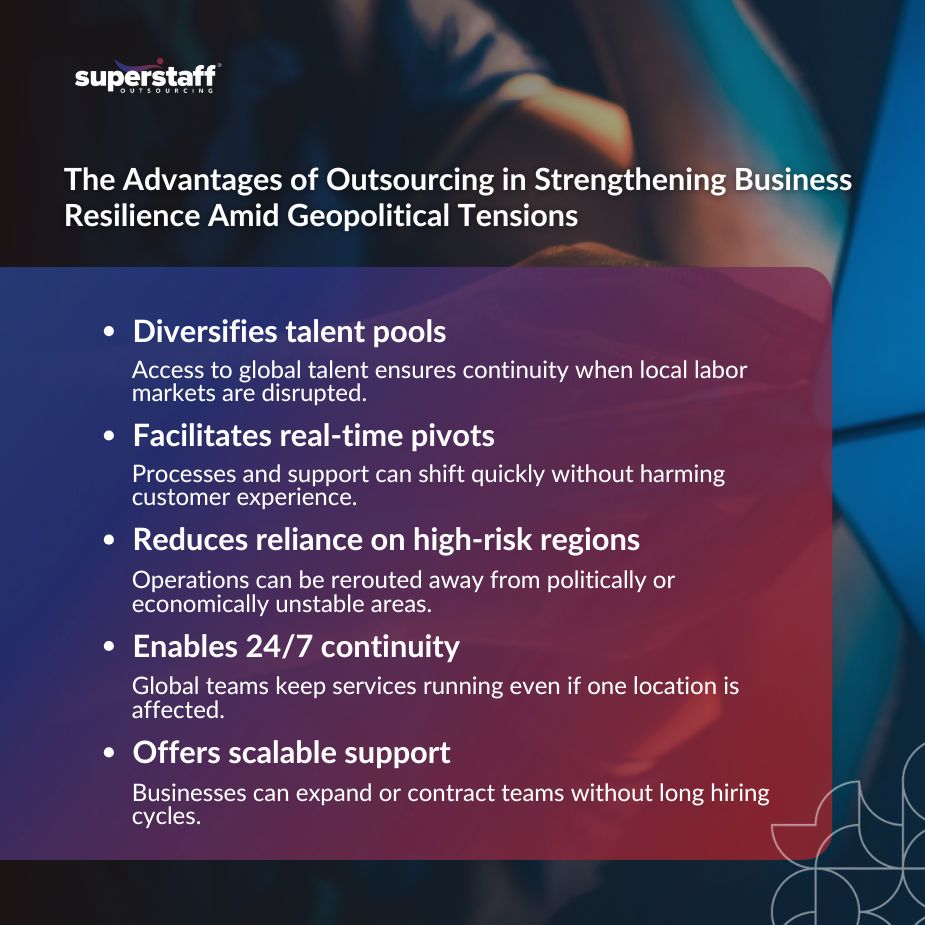
When two global flashpoints reach a ceasefire, the world breathes—but businesses don’t rest. While the recent Israel-Iran ceasefire offers a momentary sense of calm on the international stage, it also serves as a stark reminder of how fragile global stability truly is. In a world where political unrest in one region can spike oil prices, disrupt shipping lanes, or shake investor confidence across continents, business leaders can no longer afford to view geopolitical events as distant concerns.
The Israel-Iran tension—and its uneasy pause—underscores a broader truth: Global markets are tightly interwoven. A ceasefire may slow the headlines, but it doesn’t stop the ripple effects. For businesses, the challenge lies in navigating this unpredictability without sacrificing continuity, customer experience, or growth.
Just as governments turn to diplomatic strategies to defuse crises, companies must invest in structural resilience to withstand the next shock. That’s where the advantages of outsourcing come into play. Outsourcing, particularly through globally diversified partnerships, has emerged as a strategic buffer—offering flexibility, redundancy, and access to talent across multiple geographies. It’s not just about cutting costs; it’s about protecting operations when the world turns volatile.
In this blog, we explore what the Israel-Iran ceasefire teaches us about business resilience and why outsourcing remains one of the most powerful tools for future-proofing operations.
Global Flashpoints Create Business Aftershocks
Geopolitical tensions don’t stay confined to borders—they ripple through supply chains, investor confidence, and workforce security.
When missiles fly, global markets flinch. The Middle East is not just a political hotspot—it’s an economic nerve center. With its central role in oil production and global shipping routes, even the threat of war in the region can cause immediate economic consequences across the world.
A flare-up between Israel and Iran, for instance, instantly sends oil prices soaring. Since many nations, including the U.S., rely on imports to meet energy demands, rising prices squeeze transportation costs, manufacturing margins, and consumer purchasing power. That, in turn, fans the flames of inflation.
The Middle East’s Role in Global Energy Pricing
The Strait of Hormuz, through which roughly 20% of the world’s petroleum passes, sits between Iran and its Arab Gulf neighbors. Any disruption here—even a threatened one—can upend oil flows and send fuel prices spiraling. For logistics-heavy industries like retail, manufacturing, and transportation, even a brief closure can cascade into production delays and price hikes.
Military Conflicts Affect Shipping Routes and Production Timelines
When shipping lanes are compromised or rerouted due to regional conflicts, the cost of global freight can rise significantly. This was seen during past Middle East skirmishes and echoed in recent crises like the Red Sea attacks or the Suez Canal blockage. A single bottleneck can derail just-in-time supply chains that companies depend on to meet customer demand.
Talent Displacement and Travel Bans Impacting Operations
In conflict-affected regions, the workforce often faces forced displacement, loss of digital infrastructure, or government-imposed travel restrictions. For international businesses with in-country employees or partners, this can halt entire operations, delay service delivery, or force costly shifts to temporary solutions.
Businesses can’t stop wars—but they can build a structure that cushions the impact.
Ceasefires Are Fragile—Resilience Must Be Structural
A ceasefire offers temporary peace, but companies need long-term operational strategies that don’t rely on political calm.
Ceasefires, while encouraging, are fragile by nature. They may slow active conflict, but they don’t eliminate the underlying risks. For businesses, treating a ceasefire as a green light to resume normal operations without adapting is a short-sighted move.
Nearshoring/Offshoring as Part of Geopolitical Diversification
One way companies are responding is by building decentralized operations. By distributing business functions across multiple geographies—nearshore for time zone alignment and offshore for cost efficiency—they minimize exposure to any single region’s instability. If conflict disrupts one region, another can pick up the slack.
Scenario Planning and Business Continuity Strategies
Progressive companies are also investing in scenario planning. They ask: What if we lose access to a major port? What if a currency crashes? What if a region goes offline due to conflict or cyberattacks? Having playbooks for these scenarios allows leaders to act quickly when reality mirrors worst-case assumptions.
Creating Agility Through Globalized Operations
Among the advantages of outsourcing operations—particularly customer support, back-office processing, and IT functions—includes giving companies the ability to quickly redistribute workloads to unaffected regions. This global agility helps them maintain customer satisfaction and internal performance metrics even amid disruption.
Outsourcing offers more than savings—it offers stability and optionality.

The Strategic Advantages of Outsourcing in Risk Mitigation
Outsourcing spreads risk across regions, time zones, and talent pools—giving businesses breathing room during global disruptions.
The traditional view of outsourcing focused on cost reduction. But in today’s unstable landscape, it’s become a frontline tool for risk mitigation. Outsourcing partners often operate in politically stable environments and maintain robust disaster recovery and continuity plans. They also allow businesses to move fast in shifting conditions.
Business Continuity Through 24/7 Global Coverage
With teams in multiple regions, businesses can keep operations running around the clock. If unrest affects one site, another site can seamlessly take over—maintaining service levels, ensuring data security, and protecting customer trust.
Cross-Border Redundancy in CX and Back Office
Leading BPO providers design operations with redundancy in mind. This means if a data center in Europe goes down, services continue from Asia or Latin America. Redundant systems across borders help minimize downtime and prevent catastrophic loss of productivity.
Reducing Reliance on High-Risk Regions
Geopolitical forecasting is far from perfect. But companies that study outsourcing case studies and proactively pull operations away from emerging danger zones before problems escalate. By working with providers that offer multi-site delivery models, businesses can pivot without pausing.
Global volatility isn’t going away—but with outsourcing, your operations don’t have to stand still.
Turning Uncertainty Into Competitive Advantage: The Outsourcing Advantage in Crisis Recovery
Businesses that embrace outsourcing as a resilience strategy don’t just survive uncertainty—they often gain ground.
Instability forces companies to reveal their weakest points. Those with agile, outsourced support structures often outperform their competitors during these stress tests. They aren’t caught off guard—they’re ready to move.
Faster Response to Shifts in Demand
Whether due to market panic, social trends, or shifting customer needs, demand patterns fluctuate rapidly during global crises. Outsourced teams can be scaled up or down quickly—keeping costs aligned with activity and preventing service failures.
Flexibility in Scaling Teams Up or Down
During times of uncertainty, in-house hiring often freezes. Outsourcing allows companies to stay operational and even grow key business units without long-term commitments. Need 50 more agents tomorrow? It’s possible with the right partner.
Real-Time Operational Pivots Without Disrupting Customer Experience
Customers don’t care why there’s a delay—they care that it’s happening. Outsourcing provides the infrastructure to quickly shift geographies, integrate new systems, or adapt scripts and policies on the fly, ensuring consistent service even under stress.
So, what does the Israel-Iran ceasefire ultimately teach us?
Reap the Advantages of Outsourcing By Partnering With the BPO Professionals at SuperStaff
The Israel-Iran ceasefire reminds us that peace is temporary—but business resilience can be permanent if built right.
While global leaders negotiate peace, smart companies engineer stability. Outsourcing is no longer just a solution to cost challenges—it’s a strategic framework for de-risking operations in an unpredictable world. From geopolitical conflict to economic turbulence, outsourcing helps businesses stay proactive, not reactive.
Global events expose operational vulnerabilities, but outsourcing spreads risk, enhances flexibility, and supports business continuity.
When war threatens one region, operations continue from another. When labor shortages hit, global teams fill the gap. When markets panic, your customer support never flinches.
If your business strategy still hinges on local-only execution, it’s time to diversify and outsource to the Philippines. Partner with SuperStaff to build an outsourcing model designed for resilience, agility, and uninterrupted growth—no matter what global headlines say tomorrow.






